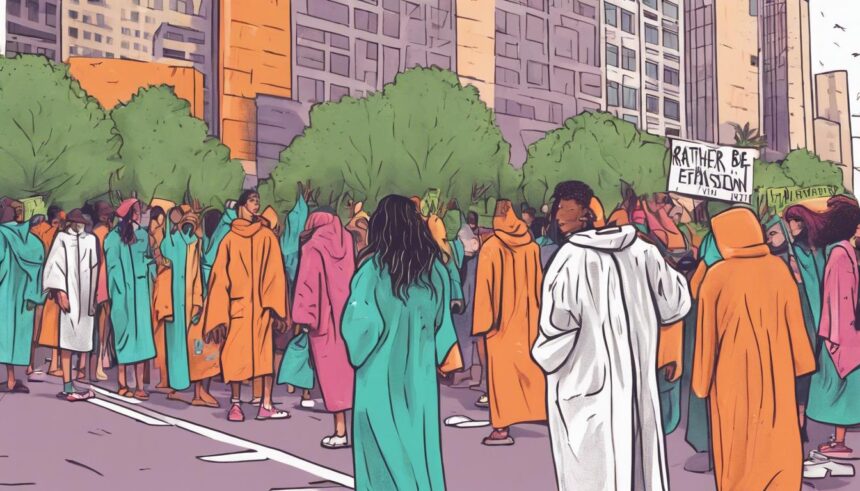On Earth Day, activists across the globe, from downtown Los Angeles to the UK, unite in protests against the fast fashion industry, calling for a shift towards sustainability and ethical practices. Spearheaded by figures like Lexy Silverstein and organizations such as Remake, the movement demands accountability and reform.
In a charged atmosphere marking Earth Day, the streets of downtown Los Angeles became a canvas of protest, not just against a single entity but symbolizing a broader stand against the fast fashion industry at large. Spearheading the movement, Lexy Silverstein, alongside supporters from the non-profit organization Remake, orchestrated a notable demonstration in front of SHEIN’s headquarters. The protest’s distinct message, encapsulated by the novel choice of attire – robes and towels bearing the slogan “Rather Be Naked Than Wear SHEIN”, struck a chord, emphasizing the urgent need for industry-wide reform towards sustainability and ethical practices.
The fashion industry, notorious for its significant environmental footprint and oft-criticized labor practices, has been under increasing scrutiny. Fast fashion, in particular, has garnered infamy for its rapid production cycles, resulting in vast waste and exploitation of labor. SHEIN, a globally recognized symbol of fast fashion, stands at the epicenter of this controversy, making it a focal point for activists demanding change.
Lexy Silverstein, a vanguard in the sustainable fashion movement, has been instrumental in rallying both public and media attention towards the environmental and ethical quagmires plaguing the fashion industry. Through her sustainable fashion blog, elexyfy.com, and engaging social media presence, Silverstein’s activism transcends mere protest, aiming to inspire a paradigm shift in consumer habits and corporate accountability. Her efforts, recognized by esteemed publications such as Vogue and The Guardian, underscore the palpable impact of grassroots mobilization in championing sustainable alternatives.
Echoing the fervor of the Los Angeles protest, across the Atlantic, a parallel initiative resonated with similar intensity. In the UK, spearheaded by Jemima Elliott—a seasoned campaigner and climate justice journalist—the focus turned towards Boohoo, another titan of the fast fashion scene. These synchronized protests, bridging continents, spotlighted a united stand against the detrimental business models pervading the fashion industry. Elliott’s critique of Boohoo underscores a broader, systemic issue, where rapid garment production marries with scant regard for labor rights or environmental sustainability, a scenario that demands urgent corrective measures.
This global chorus of dissent, amplified on Earth Day, serves as a poignant reminder of the power of collective action in advocating for change. Beyond the immediate spectacle of protest, the underlying message is one of empowerment, urging consumers, corporations, and governments to reckon with the true cost of fashion. Remake, the non-profit at the heart of these efforts, leverages this momentum to foster a more transparent, equitable, and environmentally friendly fashion industry. By shedding light on the stories of garment workers and the overarching environmental challenges, Remake endeavors to catalyze a shift towards more conscientious consumer choices and corporate practices.
As the fashion industry stands at a crossroads, the actions of individuals like Lexy Silverstein and Jemima Elliott, coupled with the advocacy of organizations like Remake, illuminate the path forward—a path that espouses sustainability, equity, and respect for our planet. Their message is clear: it’s time for the fashion industry to weave a new narrative, one that dresses the future in the garments of responsibility and renewal.





